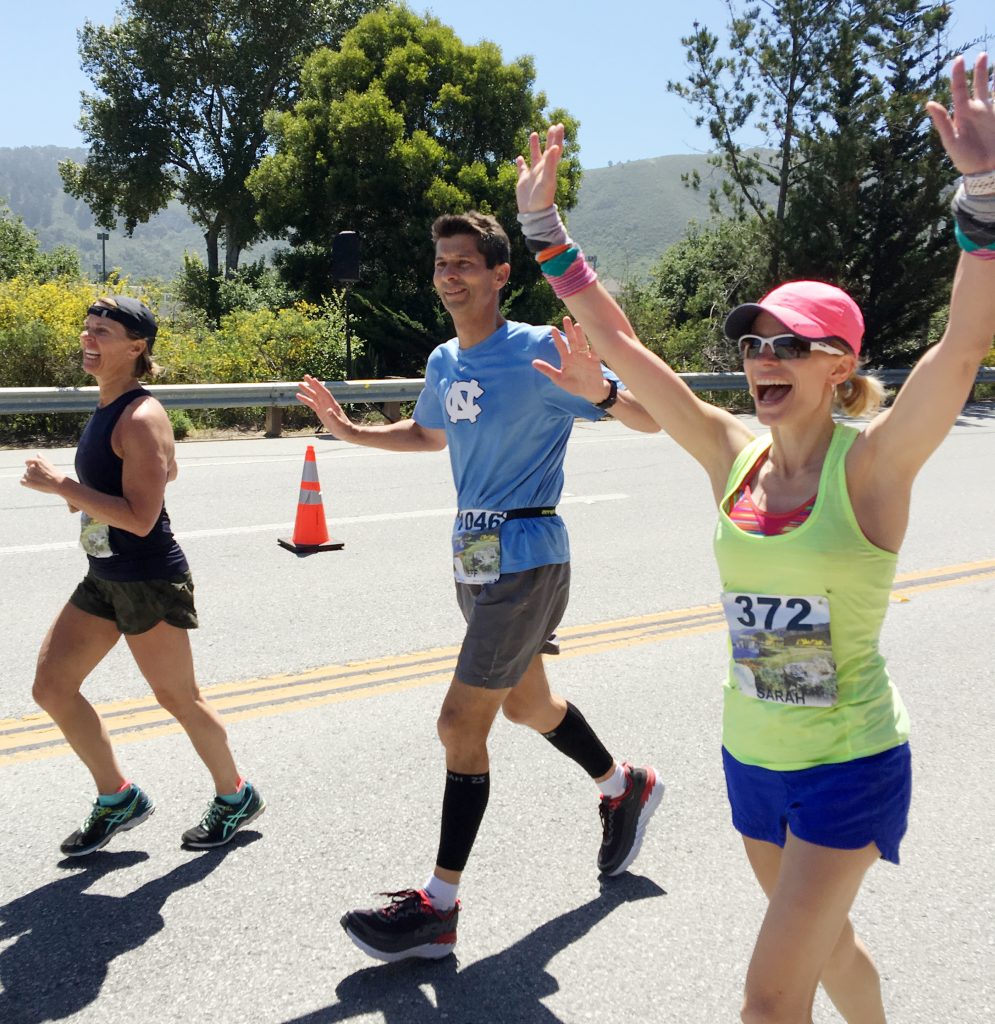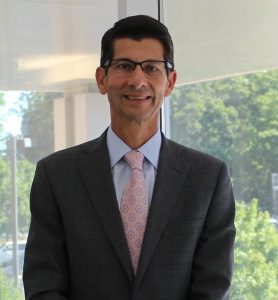One fall morning in 2016, Jeff Cobb, 54, was shaving, just as he did each day before heading to his job at First Citizens Bank in Raleigh. But something felt off.
Cobb noticed a bump on his neck, but did not think it was anything. During a routine physical exam, he mentioned it. His primary care physician indicated that it was his carotid bulb because you could feel the pulse.

Despite thinking the bump was nothing, Cobb couldn’t shake an uneasy feeling about it. His dad had experienced carotid artery issues, and Cobb worried that the bump could be a blockage.
He mentioned it to a doctor friend who worked in vascular surgery. An ultrasound showed a shadow. After an examination by a local ENT doctor and ultrasound-guided biopsy, doctors diagnosed Cobb with metastatic squamous cell carcinoma.
Though he was diagnosed in Raleigh, Cobb was referred to UNC Lineberger’s Mark Weissler, MD, FACS. Cobb, a Carolina alum, didn’t mind making the trip to Chapel Hill.
He said he thought the personal attention he received was second to none.
“For me, there was a benefit to being helped by a big health system,” he said. “You have the advantage of the tumor board, people comparing notes, clinical trials and the latest thinking.”
Catching the cancer early was fortunate. Cobb got lucky again when Weissler determined it was HPV-related, a more curable form of the disease. “He told me, ‘We’re going to punch your lights out with treatment,’ ” Cobb said.
But Cobb’s treatment regimen was a source of debate for his care team and the tumor board. He qualified for a clinical trial run by UNC Lineberger’s Bhishamjit Chera, MD, that offered the same cure rate with less impact to the body. The doctors went back and forth about radiation and chemotherapy options. Cobb said he decided to do both, driving to Chapel Hill for treatment every day for 30 days.
A challenge, a goal
Cobb handled his treatments with good spirits, but midway through, he had a question for his doctors.
“Can I run a marathon in April?” he asked.
Cobb is a long-time runner. Earlier in 2016, he had entered a lottery to run the 2017 Big Sur Marathon in California, along the Pacific Coast Highway. A group of six couples were planning to make the trip. Two months before his cancer diagnosis in 2016, Cobb got the news that he landed a spot to run the race.
“A few weeks later I get diagnosed with cancer,” he said. “I thought, ‘guess that marathon’s out the door.’ ”
Cobb had lost 30 pounds and was having issues with treatment. Chera was a good sport about Cobb’s question, telling him, “Since you’ve asked, you’re probably going to run.” Chera said Cobb was an ideal patient for this goal, since he was already an avid runner.
“Jeff had run many marathons prior to being diagnosed and treated for his head and neck cancer,” Chera said. “He came into treatment mentally and physically in tip-top shape and continued to run with his running group during radiation and chemotherapy. He did exceptionally well during treatment and tolerated treatment better than most patients. It didn’t surprise me that he wanted to run a marathon soon after treatment.”
“I think he thought I wouldn’t do it,” Cobb laughed. “It gave me a goal. I’m very goal oriented, and realizing that, I learned that it helped me persevere through the rigors of daily radiation in the throat and weekly chemotherapy.”
The long road ahead
Cobb journaled every day during his treatment and wrote down what he needed to do to get his body ready to run again. He created a training plan based on his previous experience and how his body was reacting. Cobb finished treatment in November 2016, and had hoped to train immediately after – but his body had other ideas.
The going was rough. Instead of the distance runs and speed work done in marathon training, Cobb first had to find the energy to walk. Instead of a well-rounded, healthy diet, Cobb had to start with an extra can of Ensure, then work himself up to eating solid food again.
“I had a negative association with food,” he said. “Everything tasted bad. Water tasted like metal. I waited to train until I could eat normal food.”

The new year dawned in 2017, and Cobb started training as soon as he could eat again. Then in April, Cobb and his friends finally made it to Big Sur.
He was brutally honest about the marathon. “It was not an easy race,” he said. “I had many times when I thought, ‘what an idiot, I can’t believe I did this.’ ”
It took an hour longer than his typical marathon time, but Cobb crossed the finish line with his friends beside him and his wife cheering him on at the finish line.
“I went back again this year,” he said of the Big Sur race. “I wanted to run it with a more healthy body, and I went back to get redemption.”
Looking back at his cancer journey, Cobb said he became more focused during his illness and recovery. It helped put things in perspective for him. He said he tries to reach out more to the people in his life, and is better able to leave work tasks until tomorrow and spend quality time with his family.
“The ‘Lord’s Prayer’ says, ‘Give us this day our daily bread;’ and what that means is ‘Lord, give me what I need today.’ The cancer journey makes that prayer very real. You focus on what you need today. You don’t know what tomorrow’s going to be.”
